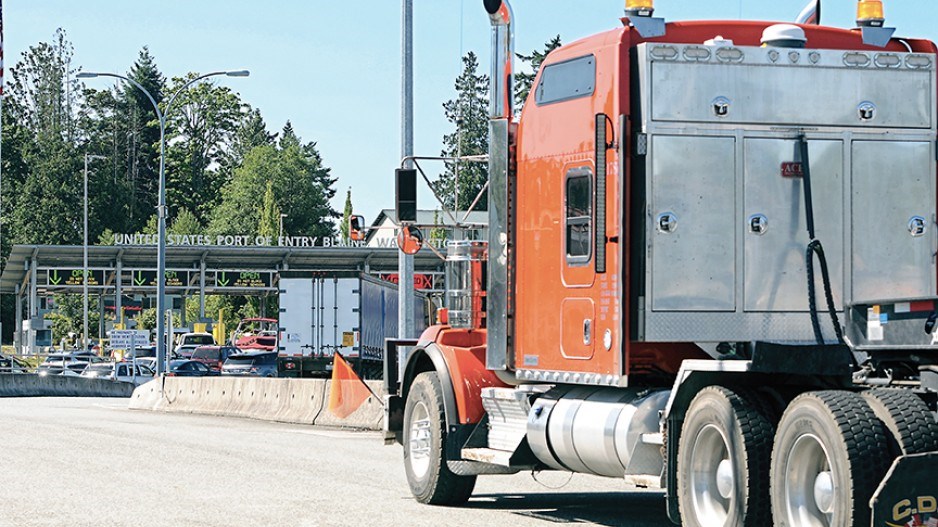Canadian cranberries were an eye-opener for John Michener when he became economic development specialist for the Port of Bellingham in 2012.
Michener was amazed at how much of the fruit was making its way into Washington state from British Columbia.
According to the British Columbia Cranberry Growers Association, B.C. produces 750,000 barrels annually, which accounts for 12% of all the cranberries grown in North America. With about 80 registered growers across the Fraser Valley and Vancouver Island, Michener said, the southbound cranberry crop points to how intertwined the two countries are in their trade relationship.
It’s a relationship that is beginning to face political headwinds, say officials on both sides of the border.
Michener recently spoke at a Surrey Board of Trade breakfast “The Effects of Renegotiating NAFTA” discussion on how communities like Surrey and Bellingham can maintain a mutually beneficial trade relationship in an uncertain political climate.
Michener acknowledged that U.S. President Donald Trump’s campaign promises to exit the Trans-Pacific Partnership – which he fulfilled during his first week in office – and to renegotiate the North American Free Trade Agreement (NAFTA) have heightened tensions between the two nations.
“During the beginning when Trump was running for president, he said NAFTA was the worst trade deal ever made, and that we’re going to blow it up, and all this rhetoric was coming out,” Michener said. “And now they’re saying, ‘Well, we’re just going to massage NAFTA. We might do some surgical changes.’”
A Western Washington University’s Border Policy Research Institute report found that Canada accounts for 31% of Washington state’s imports, a bigger proportion than any other country, and U.S. federal trade statistics show that bilateral trade between Washington state and Canada was worth $19.8 billion in 2016, with $12.8 billion of that being Washington imports from Canada.
Ken Hardie, MP for Fleetwood-Port Kells, said that whatever happens with the trade agreement, it’s likely that Surrey’s role in trade with the U.S. is going to get bigger.
“This will only become more important in the future because as industrial space becomes more scarce elsewhere in Metro Vancouver, companies will locate in Surrey to take advantage of available land and proximity to the border.”
According to the City of Surrey, the municipality has 18% of Metro Vancouver’s industrial land, of which 32% is undeveloped or vacant. Surrey also holds 40% of all of the region’s mixed-employment land.
In the agricultural sector, Surrey farms account for more than $167 million or 22% of the total gross annual farm receipts in Metro Vancouver, and a third of the city falls under the Agricultural Land Reserve. The movement of agricultural products between the U.S. and Canada is estimated at $47 billion annually, a major part of the biggest bilateral trading relationship in the world.
Cranberries alone accounted for $55.1 million worth of Canadian exports to the U.S. in 2016, according to statistics from Agriculture and Agri-Food Canada.
In B.C. “the cranberries are primarily coming out of the Lower Mainland,” Michener said. “And from what I understand most of the growers work for Ocean Spray [Nasdaq:OCESP]. Then they’re taken to a cold-storage facility in Lynden, Washington, which was built in 2014 and is being expanded to over 400,000 square feet of cold-storage space.”
U.S. Trade Representative Robert Lighthizer recently announced renegotiations between his country, Canada and Mexico would begin August 16 in Washington, D.C.
Hardie said any measures to restrict access to the U.S. market by Surrey companies would hurt our economy.
“The ‘Buy America’ initiative that the U.S. wants included in NAFTA could directly impact any company that today can bid on federal contracts or on federally funded projects at the state or municipal level,” he said.
During Surrey Mayor Linda Hepner’s state of the city address earlier this year, she said the election of Trump was “unexpected” and that international relations remained paramount to the border city’s future.
Michener said regardless of what’s going on in the White House, the trade between Washington state and B.C. will go on.
“I just get the feeling that people are going to continue operating when they see good opportunities,” he added. “You might have to have a Plan B or Plan C, and in the past you might not have had to have done so much strategic planning.”




